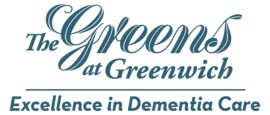Music therapy is a powerful, evidence-based approach that has been shown to provide numerous benefits for individuals living with Alzheimer’s and other forms of dementia. Studies have shown that music therapy can stimulate memories, enhance cognitive function, improve mood, and facilitate social interactions. At The Greens at Greenwich, we recognize the value of music therapy and have integrated this therapeutic approach into our comprehensive memory care program.
Our personalized music therapy program is grounded in the belief that all residents possess unique musical preferences, and we strive to create meaningful and engaging experiences for each individual. By incorporating a wide range of music-related activities, such as live performances, group sing-alongs, and personalized playlists, we aim to address our residents’ diverse needs and interests.
This blog post will discuss the science behind music therapy and its benefits for individuals with Alzheimer’s and dementia. We will then provide an in-depth look at how The Greens at Greenwich incorporates music therapy into our memory care program, highlighting specific activities and success stories from our community. Finally, we will offer tips for caregivers and family members seeking to implement music therapy techniques at home.
Join us as we delve into the power of music therapy for enhancing the lives of those living with Alzheimer’s and dementia and learn how The Greens at Greenwich is dedicated to providing innovative, person-centered care that caters to the unique needs and preferences of our residents and their families.
The Science Behind Music Therapy and Its Benefits
Research has demonstrated that music therapy can have a significant impact on individuals living with Alzheimer’s and dementia. Some of the key benefits of music therapy include:
– Cognitive stimulation: Music can activate various areas of the brain, helping to maintain and improve cognitive function.
– Emotional well-being: Engaging with music can elicit positive emotions, reduce anxiety and agitation, and provide an outlet for emotional expression.
– Social engagement: Participating in music therapy activities can foster social connections and create opportunities for shared experiences with fellow residents, family members, and caregivers.
– Behavioral management: Music can serve as a helpful tool in managing difficult behaviors often associated with Alzheimer’s and dementia, such as agitation and aggression.
Implementing Music Therapy at The Greens at Greenwich
At The Greens at Greenwich, our commitment to providing innovative and person-centered care includes integrating music therapy into our memory care program. Some of the ways we incorporate music therapy include:
– Personalized playlists: Our caregivers work with residents and families to create customized playlists featuring residents’ favorite songs and artists. These playlists provide a comforting and familiar auditory experience, contributing to a sense of well-being.
– Live performances: We invite local musicians to perform for our residents, offering a dynamic and engaging musical experience that stimulates cognitive processes and promotes social bonding.
– Group sing-alongs: Group sing-alongs provide an opportunity for residents to engage in active music-making, fostering joint attention, social connection, and emotional expression.
– Musical reminiscence activities: Music-based reminiscence activities engage residents in recalling memories associated with specific songs or musical eras, helping to improve memory function and evoke positive emotions.
We continually assess and adjust our music therapy program to ensure that it effectively meets the unique needs and preferences of our residents.
Music Therapy Success Stories at The Greens at Greenwich
Our personalized approach to music therapy has led to numerous success stories within our community. Some examples include:
– Memory recall: Residents who may otherwise struggle to recall specific details from their lives often experience vivid memories when listening to familiar songs, creating opportunities for meaningful conversations.
– Emotional connections: One resident, who struggled with verbal communication, was able to engage with her family by singing along to her favorite songs during visits. This shared experience fostered a sense of connection and joy for both the resident and her family.
– Reduced agitation: Another resident, prone to agitation and aggression, found solace in listening to his personalized playlist, resulting in noticeable improvements in his overall mood and demeanor.
These examples demonstrate the transformative impact music therapy can have on the lives of individuals living with Alzheimer’s and dementia.
Tips for Caregivers and Family Members
Caregivers and family members can implement music therapy techniques in their interactions with loved ones living with Alzheimer’s or dementia. Consider the following tips:
– Identify musical preferences: Learn about your loved one’s favorite songs, artists, and genres, using this information to create personalized playlists or incorporate music into your interactions.
– Choose appropriate music: Select music with a steady rhythm, simple structure, and familiar melodies to maximize cognitive engagement and emotional connections.
– Encourage active participation: Encourage your loved one to sing along, tap their feet, or dance to the music, as these activities can enhance cognitive stimulation and emotional expression.
– Be flexible and responsive: Remember that each individual’s needs and preferences can change, so adapt your music therapy techniques accordingly, and be prepared to try different approaches.
Conclusion:
At The Greens at Greenwich, our dedication to providing innovative and person-centered memory care extends to our integrative approach to music therapy. By offering our residents various opportunities to engage with music and implementing strategies that cater to their unique needs, we have witnessed firsthand the transformative power of music therapy for enhancing cognitive function, emotional well-being, and social engagement. Join us in embracing the healing potential of music therapy, and discover how our dedicated team at The Greens at Greenwich strives to create a nurturing and supportive environment for residents and families alike.
Explore the exceptional memory care services in Connecticut only at The Greens at Greenwich. Schedule a tour or contact us for more information.
We're looking forward to speaking with you.
Click to call 203.531.5500 or complete the contact form to Schedule a Tour of our Assisted Living Community with Executive Director, Maria Scaros.
1155 King Street, Greenwich, CT 06831
Contact Us


© Copyright 2023 The Greens at Greenwich. All Rights Reserved.
The Greens at Greenwich is proudly powered by WordPress

